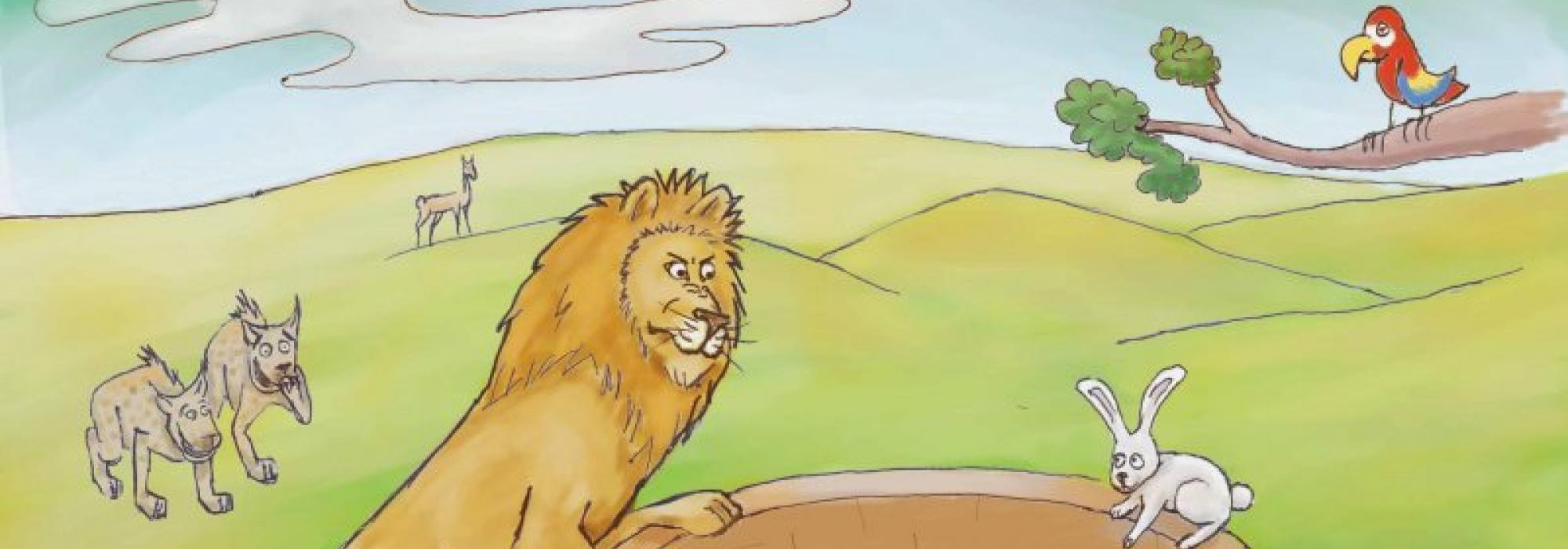The Story of Śūryavarmā
There lived a royal servant called Śūryavarmā. Once, when he came home, found that his wife was in the company of his friend. He withheld his anger thinking – What is the use of killing this animal, the disloyal friend? What will I get out of punishing this pāpī? I will acquire pāpa by killing them!
Speaking to them, he said “Don’t ever get seen by me! If I spot you again, I will kill you both!”
The two disappeared. He married another lady and lived happily ever after.
“No calamity bothers the wise. Animals too attain glory out of their wisdom and not due to aggression.”
He also narrated the story of the lion and the oxen [Here start the stories of Pañcatantra]
The Story of the Lion and the Oxen
There lived a wealthy merchant in a certain city. Once, when he was on his way back after a trade in Madhurāpurī, the yoke of his bullock cart broke down and one of the oxen collapsed, breaking its leg. As he did not have the required facilities to bring it back, he left it there and went ahead. Sañjīvaka, the ox which had thus fallen, started grazing along the banks of the river Yamunā and with time, turned into a strong bull.
Once, a lion named Piṅgalaka came to the river to drink its waters. On its way, it heard the bellowing of the bull Sañjīvaka, got scared and went back. Its minister, a fox named Damanaka said to another minister called Karaṭaka – “We will need to find out why our lord has returned without drinking water!” Karaṭaka said – “What do we gain by knowing it? We might become like the monkey that removed the peg (fulcrum) from the log of wood!
In a city, there lived some carpenters who worked on logs of wood. Once, they were sawing large pieces of wood and wished to take a break. They kept a small piece of wood between the half-cut log and went home. A curious monkey sat at the place where the log was cut and pulled out the small piece that was placed to keep the half-cut pieces apart. The next moment, the two half-cut pieces came together – the monkey got caught in between the pieces and was crushed.”
Damanaka did not agree with him. He went to the lion and discovered the reason. He said – “Should we get scared only by listening to a sound? We will need to examine reality.
~
Once, a fox went to a battlefield in the search of food. While scavenging, it heard a loud sound and turned in that direction. There was a kettledrum that had fallen there. It wondered if it was actually an animal (in the form of a drum) making such a loud sound.
But it had fallen down and lay still. Therefore, it was ascertained after approaching it that it wasn't an animal. The darbhā grass that had grown luxuriantly nearby, was swaying in the wind and when it struck the hide with force, a loud sound emanated from it. Realizing this, it let go of its fear. Curious if some delectable snack lay inside, it tried to tear open the hide. There was nothing. Therefore, people of a similar mind would hardly fear a sound coming in the distance. If you so wish, I shall personally go there and verify the source of the sound!” Saying so, he went in the direction of the sound and found the bull that was grazing the grass. The fox reported this to the lion, who then said, “Go and bring that bull here!” The bull was afraid. Therefore, the fox sought protection from the lion and then took the bull to meet him. From then on, the lion developed disinterest in all other animals. At that point, Damanaka said, “I made a mistake by bringing this bull here; now, the lion is eating meat all by itself, without sharing anything with us! Therefore, we must get this bull killed.” Karaṭaka said, “You are incapable of doing that!” Damanaka replied, “If one uses his brains, it is surely possible. Listen, I will narrate to you the story of the crocodile that killed the crane:-
~
There lived a crane near a lake. It approached the fish in the lake and said, “Fishermen will catch you easily if you are here and so I shall take you to a secret pond that lies elsewhere.” Convincing them that the fishermen don't have access to the other pond, the crane would pick up the fish one by one, fly with it to a boulder nearby and then kill it to partake of a hearty meal. In due course, one day it took a crocodile with it. As they approached the boulder, it saw the pieces of bone lying about and realized that the crane was feeding on the fish. As soon as the crane landed, the crocodile lunged at its throat and crushed it. True strength is the strength of the intellect. What is the use of the strength of a fool? Listen, as I tell you the story of the lion and the hare:-
~
Once lived a lion in a forest that indiscriminately killed other animals. The animals and the lion agreed on a pact: every day a certain animal would be sent to the lion as his meal and in exchange he would not go about killing animals randomly. The lion adhered to the pact and stopped its rampage. One day, it was the turn of a certain hare to become the lion's meal. The hare thought, “At any rate, my death is certain; so why not try a stratagem and see if something comes out of it!” and went late to the lion's den. The lion thundered, “Why are you so late?” The hare replied, “Lord! It is not my fault. On the way, I met another lion and so I was delayed.” The lion was enraged and roared, “Which is that other lion; show me!” Then the hare took the lion to a well and said, “Look inside!” The lion saw its reflection in the water and was fooled into believing that it was another lion. In its anger it jumped at the other lion and fell into the well, only to lose its life. – In a similar manner, using my intellect I will achieve this!” So saying, it went to the lion and told him that Sañjīvaka wished to kill him and usurp the jungle kingdom. It further told the lion that the bull was going around telling all the animals: ‘I subsist on grass; you need not fear if I become the king. This lion is a bloody meat-eater!’ The lion said, “What will this grass-eating bull do to me? But I have granted it protection! How can I now kill it?” Damanaka replied, “What affection must you have for that traitor? Neither is there surrender on his part nor refuge-granting on your part. Further, if it remains near you, insects and worms that emanate from its urine and dung will enter your wounds that have been made by elephants in rut; what then will be your plight?
~
It would still mean you’d be killed by tact. An evil person might not harm you directly but even his company is harmful. A louse named Mandavisarpiṇ ī had somehow made its residence in the bed of a king. Wind accidentally brought a bedbug by name Ṭīṭibha and deposited on the same bed. The louse scolded the bedbug saying, ‘Why have you come to my house? Go away!’ the bedbug begged, ‘I’ve never tasted the blood of a king; with your permission I’ll have some.’ The louse replied, ‘You should bite him softly at an appropriate time, either while he is asleep or when he is sporting!’ The bedbug agreed. But during the night the bedbug bit the king, as soon as he was on the bed about to sleep, the king woke up with a start, screaming, ‘something has bit me!’ The bedbug hid itself. His attendants came and found the louse and killed it. Likewise the company of the bull isn’t favourable to you. ” Damanaka said so and went to Sañjīvaka. Sañjīvaka asked Damanaka, ‘Why do you look forlorn? Everything alright?’ Damanaka replied, ‘For a servant where can there be well-being?’ Who can be in favour of the king always?’ It continued and said that the lion is planning to kill the bull. The foolish bull believed that and said, ‘A king who has bad company is definitely an enemy; I’ll narrate a story listen,
~
There lived a lion in a forest; three animals, a tiger, a crow and a fox were his dependents. It once saw a camel; it was intrigued as it had never seen a camel before and asked around about it. The crow, which had travelled far and wide and was knowledgeable, said that it is a camel. The lion welcomed it, and also gave assurance that it won’t be harmed. Once the lion was gravely injured after having fought with an elephant and was not able to hunt for food. It consulted its three friends in secrecy about it. They said, ‘My lord! What does it mean to be friends with the camel? Why don’t we eat it? It’s a herbivore after all; it's the food for us, carnivores!’ ‘But I’ve assured it before that it won’t be harmed! How can I kill it?’ the lion protested. The three replied, ‘We will make it offer itself voluntarily.’ The crow said to the camel, ‘The king is tormented by hunger; but he doesn’t ask us anything; we have decided to offer ourselves as food; do whatever you feel to earn his affection!’ The naive camel agreed to it. They all went to the lion. The crow offered, ‘O lord! You can eat me!’ The lion replied, ‘You are so small; what use would it be?’ The fox offered itself, the lion gave the same reply. Then the tiger offered, but the lion didn’t eat it. Finally, the camel offered itself. Lion took its words seriously and killed it. All of them ate the camel.
~
Like this someone has complained about me; therefore, the king feels that I’m his enemy; let my fate take care of it!’ Sañjīvaka said. Damanaka said, ‘Be brave! Braveness is the best option….
A tiṭṭibha bird lived on a sea shore along with its wife. One day, when the female tiṭṭibha bird became pregnant and said to its mate: ‘Let us go someplace else. If we continue to stay here, I fear that the ocean’s waves will sweep my eggs away!’. The male bird replied: ‘The ocean wouldn’t dare to make an enemy out of me!’. The wife asked ‘Do you really think you are a match for the ocean? If you don’t listen to my advice, we are as good as dead. Listen to this story -
A tortoise named Kambugrīva had two swans for friends - Vikaṭa and Saṅkaṭa. When the lake in which they lived started drying up, the swans planned to fly off to a distant bountiful lake. The tortoise keenly expressed its wish to join them. The swans agreed and said, ‘The lake we will be flying to is quite far away. If you wish to join us, you must do exactly as we say. Hold on to the middle of this stick with your jaws. We will snap our beaks on to its ends and lift off with the stick while you hold on. Beware, though! Be absolutely sure to keep your mouth shut all the way until we reach our destination. If you open your mouth even for a moment, you shall die!’. The tortoise readily agreed. And thus, they took off in this arrangement and were still some distance from the destination, when they flew across a town. The townsfolk beneath came out and thronged, staring at the skies. Someone said ‘Look! Those swans are carrying something between their beaks! Come, see this strange spectacle, everyone!’. The tortoise could not contain its curiosity and wanted to ask ‘What is all this noise?’ and opened its mouth! Needless to say, the stupid animal instantly fell to its death.
~
Thus, dear husband, one must listen to sage advice. Otherwise, disaster ensues!’. The male bird responded ‘Dear one, what you said is quite true! But listen to this story which I am about to narrate:-
In the depths of a river lived three fish known as Anāgata-vidhāta, Pratyutpanna-mati, Yad-bhaviṣya. One day, a few fishermen rowing past exclaimed ‘There are fish here!’ Sensing danger just by listening to their talk, Anāgata-vidhāta swam away to a different place. Pratyutpanna-mati calmly thought: ‘If there is danger, we’ll find a way out!’ and stayed back. The fishermen cast their nets and it got trapped. A composed Pratyutpanna-mati lay still, playing dead. The fishermen fell for the ruse and placed it down. In a flash, the smart fish jumped up and dived right back into the river and escaped before they even knew what happened. The third fish Yad-bhaviṣya too got caught in the net and struggled hard to free itself. Needless to say, the men quickly dispatched it to its death and took it home.
So, my dear, trust me when I say that I will find a way out. We don’t have to flee merely out of fear of the sea!
~
As days passed, the female bird laid eggs. Then, the ocean, curious to see what the bird might indeed do, sent forth its waves and swept in the tiṭṭibha eggs. The female bird’s grief knew no bounds, and it began wailing loudly. The male tiṭṭibha sternly declared: ‘Worry not! Now see what I’ll do to this evil ocean’. It gathered all the other birds and went to Garuḍa, the king of all birds and narrated its ordeal. Garuḍa in turn approached his master, lord Viṣṇu and pressed the case for the tiṭṭibha birds. Viṣṇu grew furious and released from his bow, the agneyāstra. The missile scorched the ocean and returned the eggs to the tiṭṭibha couple.
Narrating this story to Sañjīvaka, Damanaka said: ‘Thus a wise man remains steadfast when danger approaches.
The current article is a translation of Prof. A R Krishnasastri’s Kannada classic Kathāmṛta along with additional segments added from the original Kathā-sarit-sāgara (of Soma-deva). Bṛhat-kathā-mañjarī (of Kṣemendra) and Bṛhat-kathā-śloka-saṃgraha (of Budha-svāmin) have also been referred to. The translation has been rendered by Raghavendra GS, Arjun Bharadwaj, Srishan Thirumalai, and Hari Ravikumar.
The original Kannada version of Kathāmṛta is available for free online reading. So are the other works of Prof. Krishna Shastri






































